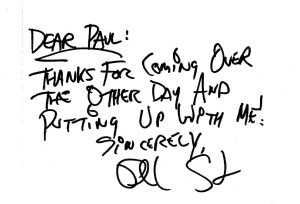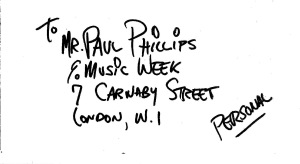Paul McCartney. Height of The Beatles. In your village, Sunday afternoon. Ooh, got a new song. Let’s all go down the pub. Hey Jude…..
This is my favourite Beatles story, which I first heard from my friend Alan Smith.
Alan was a Liverpool journalist who journeyed south in the wake of The Beatles. He went on to become an iconic editor of NME. He took it from a 16-page weekly, struggling to sell 50,000 copies to a veritable door-stopper that topped out at 272,000 copies a week. He achieved this stunning turnaround in 18 months. He also hired Julie Burchill and Tony Parsons.
Anyway, he told me the story about the day in 1968 he had been driven up to Yorkshire with Paul McCartney and Derek Taylor. Derek is often referred to as The Beatles’ publicist, but he was so much more than that. We’ll get to Derek.
Up in Yorkshire, McCartney was producing Thingumybob by the Black Dyke Mills Band.
On the way back down the A1 (it might have been the M1, but this isn’t a Monty Python sketch) Paul asked for the road map. They needed a break, maybe some food. He looked through the names of nearby towns and villages. Decided he really liked the sound of Harrold, in Bedfordshire.
They went to Harrold.
According to Alan Smith (and I later read in Derek’s book, As Time Goes By) Paul strolled through the village, chatting to the locals who were doing their weekend chores – clipping hedges, mowing lawns, washing cars.
They all ended up down the pub, and McCartney sang – for the first time to an audience – Hey Jude. What would you give to have been in the Oakley Arms, Harrold, on June 30, 1968? To know that you were the first people in the world to sing along at the end – “Na na na nana na na”?
Alan’s first wife, Mavis, worked at Apple. She was a tiny, beautiful girl who could be quite fierce, but also vulnerable. She it was who named Hot Chocolate, whose first recordings were released on Apple.
There’s Errol Brown and his chums, in a crowded office. Someone says, “Name this band.”
Erm….
“Hot Chocolate!” says the secretary on the middle desk.
Done. And a 40-year career is launched.
And at the centre of this chaos was Derek Taylor. His office at 3 Savile Row was always what used to be called a ‘scene’.
But Derek appeared calm, above it all, languidly, wittily having his way with the world.
One time a bunch of us were just passing time. Derek was having fun with one of the writers from Disc magazine who had described Apple’s offices, in print, as “swish”.
“Well,” says Derek, “you do know what ‘swish’ means in America?” Always sardonic. “As long as you think you know what you’re doing……”
And before he can finish the thought, in walks George Harrison, trailed by a ragged band of colourful folk.
John and Paul were smaller than their publicity (I wrote about that here). George was even shorter. But the charisma emanated from him like testosterone from a prize fighter. By his side, Phil Spector seemed insignificant.
“Derek, I don’t know if you’ve met Phil Spector?”
So much musical history in that one sentence. Here was Phil Spector, in town at Allen Klein’s behest (if you believe Allen Klein) or George’s and John Lennon’s (if you believe Wikipedia) to rescue the Get Back tapes from a locked cupboard and turn them into the album that became Let It Be.
Later, Spector would produce George’s stunning solo debut, All Things Must Pass, and then John Lennon’s first two solo albums. Although Ringo remembers it rather differently, commenting that he barely witnessed any input from ‘Phil’ on the Lennon sessions. No such doubts with All Things. Spector was all over it.
So, this was the world that whirled around Derek Taylor. A difficult man to describe. Urbane, witty, charming – but none of that will get you close to the experience of his use of the English language. Almost poetry on the hoof.
There are rare instances of him caught on YouTube. But nothing gives you the flavour of a man who could make even a mundane statement sound like Edward Lear thinking out loud.
Once, confronted with a transatlantic telephone call from a radio station ‘checking that Paul was dead’, Derek pointed out that “the best possible proof of Paul McCartney still being alive is that he is, in fact, still alive.”
And no, he didn’t believe Paul talking to the station in America would prove anything. People would just say it wasn’t Paul.
“The only proof we need that Paul is alive is that he is. You don’t have to produce yourself, or appear on television, or speak. You just have to be alive.”
With this kind of directness of tone, but also a beautiful lyricism, Derek wrote a memoir, As Time Goes By, which is about more than his time with the Beatles. This is a guy who came down from Liverpool – where he was an experienced and established journalist, eight or so years older than John and Paul – and ended up working not only with The Beatles, but in America with the Byrds, The Beach Boys, Harry Nilsson and, one of his own favourite moments, The Monterey Pop Festival of 1967.
From the age of about 30, his entire life was like that day in Harrold in 1968. If you like this story, there are plenty more like it in It Was 20 Years Ago Today and As Time Goes By, both available from Amazon. Put them on your Christmas list. They’re not cheap, but well within stocking filler range.
Meanwhile, all this talk of the 60s made me nostalgic, so I made this cover version of one of my favourite pre-Beatles songs. It’s made with loops of electronic chill music. But my guitar and vocals drag it back from contemporary to slightly cheesy. Hope you find it an interesting version.

